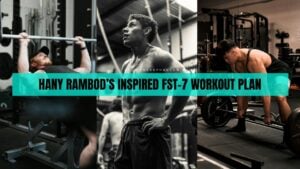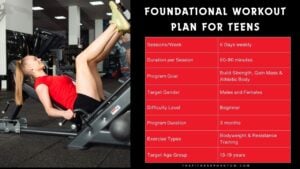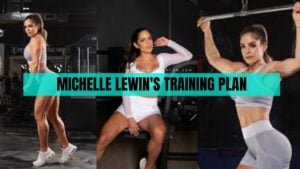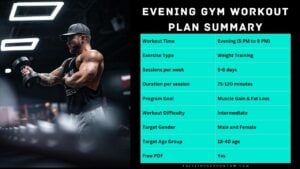If you want to bolster your quads, hamstrings, glutes, and calves with barbells only, this article can help you.
In this article, I’ve shared the 20 best barbell leg exercises that will help you increase strength and mass and enhance your athletic performance.
I’ll also share how you can integrate those exercises into your training program to maximize your lower body strength and shape your legs and glutes.
This post is also great for people who want to combine dumbbell, barbell, band, and machine exercises to create an ultimate leg workout routine.
Benefits of Training Legs with Barbells
Every exercise equipment has some best features, whether it’s a barbell, dumbbell, or machine. And when it comes to barbells, they provide an excellent range of motion, help lift the maximum load, and target large muscle groups effectively.
Barbell also allows you to perform various compound leg exercises, such as back squats, step-ups, lunges, and deadlifts.
Compound movements recruit multiple muscles simultaneously and help facilitate strength and hypertrophy.
With barbells, you can train every lower body muscle effectively, including the quads, hamstrings, glutes, and calves, and help build firm and aesthetic legs.
A Brief Overview of The Lower Body Muscles

The lower body primarily has four muscles to target for bodybuilding – quadriceps, hamstrings, calves, and glutes.
Quadriceps are large muscles of the front part of your legs that spread from hips to knees. They are responsible for most of the day-to-day activities, such as running, jumping, and walking.
Hamstrings are located on the back of your thighs between the glutes and knees. They engage during the knee flexion and hip hinge. Hammies also play a crucial role when you hop, run, sprint, or bend forward to pick up objects.
The glutes are one of the largest muscles of the lower body situated between the hips and hamstrings. Strong glutes help you sit longer, stabilize the lower back, and help during various lifting and athletic movements.
Calves are a small but essential part of the lower body. It is located on the back of your lower legs, between your heels and knees.
And to develop powerful legs and glutes, you need to work on each muscle.
20 Barbell Exercises for Powerful Legs and Glutes
- Back Squat
- Front Lunges
- Sumo Deadlift
- Landmine Squat
- Barbell RDL
- Good Morning
- Single Leg Deadlift
- Step-up
- Hip Thrust
- Calf Raises
- Front Squat
- Zercher Squat
- Reverse Lunges
- Hack Squat
- Lateral Lunges
- Jefferson squats
- Bulgarian Split Squat
- Rack Pull
- Barbell Seated Calf Raise
- Sumo Squat
1. Barbell Back Squat

| Force Type | Mechanics | Level | Muscles Worked |
|---|---|---|---|
| Push | Compound | Intermediate | Quad, Biceps Femoris, and Glutes |
The back squat is a highly effective exercise that can alone build stronger legs and improve power performance.1 Effect of 8 weeks of free-weight and machine-based strength training on strength and power performance – Journal of Human Kinetics
It works on several muscles simultaneously, such as the quadriceps (primary), glutes, calves, and core.2 Effects of squat training with different depths on lower limb muscle volumes – European Journal of Applied Physiology
Doing back squats with a barbell produces higher activation in the lower body and increases strength and size over time.
Steps to do it:
- Place a loaded barbell on the back of your shoulders and stand upright with your feet shoulder-width apart, toes pointing slightly out.
- Brace your core, inhale, and bend at your hips and knees to squat down until your glutes are parallel to the floor.
- Push into the floor with your feet to slowly return to the standing position.
- Your back should remain flat during the entire movement.
2. Barbell Front Lunges

| Force Type | Mechanics | Level | Muscles Worked |
|---|---|---|---|
| Push | Compound | Intermediate | Legs and Glutes |
The lunge is of the best barbell exercises for legs that hit the quads and glutes and helps increase strength, balance, and flexibility.
Steps to do it:
- Put the appropriate weight into the bar and hold it on the back of your shoulders.
- Taking a large step, bring your right leg forward while keeping the rear foot in the same position.
- Bend at your knees until your rear knee touches the floor.
- Pushing through your leading foot, extend your knees to complete your first repetition.
- Keep your core tight, chest up, and back straight during the entire movement.
3. Barbell Sumo Deadlift

| Force Type | Mechanics | Level | Muscles Worked |
|---|---|---|---|
| Pull | Compound | Intermediate | Thighs and Glutes |
The Sumo deadlift works on the inner and side parts of your thighs and helps develop firm and defined legs.
It is also suitable for beginners as it puts less stress on the lumbar spine than the conventional deadlift.3 Exercise Highlight: The Sumo Deadlift – Research Gate
Steps to do it:
- Insert the appropriate weight into the bar and stand upright with your shin close to it.
- Keep your feet two times wider than hip-width apart, with your toes pointing outward.
- Brace your core, keep your back straight, and lower yourself to hold the bar firmly.
- Your hands should be hip-width apart and between your legs. That’s the start.
- Pressing your foot against gravity, lift the bar with your full strength until your hips are fully extended.
- Slowly return the bar back to the start. That’s one rep.
4. Landmine Squat
| Force Type | Mechanics | Level | Muscles Worked |
|---|---|---|---|
| Push | Compound | Intermediate | Legs and Glutes |
The landmine squat is a popular leg workout that works on glutes, calves, and primarily the quads.
It hits the leg muscles from a different angle and helps build sturdy legs without putting much stress on the joints.
Steps to do it:
- Insert one end of the bar in the landmine attachment and put the appropriate weights into another end.
- Grab the end of a barbell with your hands and stand in the shoulder-width stance with your toes pointing slightly out.
- Keep your arms bent with your hands close to your chest, and lean your torso forward slightly.
- Lower into a squat until your thighs are parallel to the floor.
- Push through your feet to return to the standing position.
5. Barbell Romanian Deadlift
| Force Type | Mechanics | Level | Muscles Worked |
|---|---|---|---|
| Hinge & Pull | Compound | Intermediate | Hamstrings, Glutes, & Glutes |
The Romanian deadlift provides a decent stretch to the hamstrings, activates the gluteal and lower back muscles and helps build firm and flexible legs.
Steps to do it:
- Pick a loaded barbell with your hands just outside the hips and stand upright in the normal stance.
- Keep your arms straight in front of your thighs with your palms facing.
- Lower your torso by pushing your hips back until the bar reaches shin level (there will be a soft bend in your knees).
- Pressing through your feet, slowly return to the standing position until your hips are extended. That’s the one rep.
6. Barbell Good Morning
| Force Type | Mechanics | Level | Muscles Worked |
|---|---|---|---|
| Hip Hinge | Compound | Intermediate | Posterior Chain |
The barbell good morning stretches posterior chain muscles, improves hip mobility, and makes your lower body flexible. Having flexible muscles helps enhance performance and minimize the risk of injuries.
Steps to do it:
- Place a bar on the back of your shoulder and stand straight in the shoulder-width stance.
- Keep your core tight, chest up, and back straight. That’s the start.
- Lower your torso forward (without bending your knees) until your chest is parallel to the floor.
- Pause for a movement, and return your torso to the upright position by pushing your hips forward. That’s one complete rep.
7. Single Leg Deadlift Exercise
| Force Type | Mechanics | Level | Muscles Worked |
|---|---|---|---|
| Hip Hinge | Compound | Intermediate | Thigh, Glutes, Core, and Lower Back |
The single-leg deadlift is a unilateral exercise that increases strength, flexibility, and balance throughout the lower body. It is also a great way to even out strength imbalance and make your legs equally strong. 4Comparison of EMG Activity between Single-Leg Deadlift and Conventional Bilateral Deadlift in Trained Amateur Athletes – An Empirical Analysis – International Journal of Exercise
Steps to do it:
- Put the desired weight into the bar and stand straight in the shoulder-width stance with your shin close to it.
- Hinge forward at your hips to grab the bar and maintain a slight bend in your knees.
- Lift the bar as you return to standing so your hips come forward.
- Lower the bar just below your knees and raise your left leg behind you as high as possible so your hamstrings can engage – both at the same time.
- Hold for a couple of seconds before returning to the starting position. Perform more reps for your weaker leg.
8. Barbell Step-up
| Force Type | Mechanics | Level | Muscles Worked |
|---|---|---|---|
| Push | Compound | Intermediate | Legs and GLutes |
The weighted step-up bolsters quads, glutes, and hamstring, improves hip mobility, enhances balance, and helps develop the lower body.5 Gluteus Maximus Activation during Common Strength and Hypertrophy Exercises: A Systematic Review – Journal of Sports Medicine and Sciences
If you’re an athlete, you can also include the step-up into your training program to maximize your jumping and running performance.
Steps to do it:
- Place a bar on the back of your shoulders and stand in the normal stance.
- Lift your right foot off the floor and put it on an elevated object to step up.
- Once you step up, bring both your legs together on that object. That’s one rep.
- Reverse the movement and repeat the eight to ten times on each side.
9. Barbell Hip Thrust

| Force Type | Mechanics | Level | Muscles Worked |
|---|---|---|---|
| Push | Compound | Intermediate | Glute, Hamstrings, and Core |
If you want to increase the strength and size of your glutes, you should do a barbell hip thrust.
The barbell hip thrust also works on the hamstrings and helps you improve other compound lifting, such as the deadlift, squat, running, and sprinting.
Steps to do it:
- Place your upper back on the bench with your face up.
- Hold a bar on your hips with desired weights.
- Keep your feet flat on the ground and glute parallel to the floor. That’s the start.
- Brace your core, hips, and thighs.
- Thrust your hips upward as high as possible so you feel the work in your glutes, Maximus.
- Squeezing your glute, pause for a moment, and then lower your hips to the start.
- Do complete three to four sets of 8 to 10 repetitions each.
10. Barbell Calf Raises
| Mechanics | Level | Muscles Worked |
|---|---|---|
| Isolation | Intermediate | Calves |
The barbell calf raise isolates your calves and helps you build absolute legs.
Calves are small muscles, but they play a crucial role in overall lifting and athletic performance.
Steps to do it:
- Place a barbell on the back of your shoulders, and stand tall with your feet hip-width apart.
- Raise your heels as high as possible, pause for a second, then return to the start. Perform as many times as you like.
11. Front Squat

| Force Type | Mechanics | Level | Muscles Worked |
|---|---|---|---|
| Push | Isolation | Intermediate | Quadriceps |
The front squat primarily targets the quad and helps improve the appearance of your front thigh.
It is an excellent alternative to the back squat for people with knee problems, as a study published by the Journal of Strength and Conditioning Research has shown that front squats generate less compressive forces and extensor moments and put less stress on the knees compared to the back squat.
Steps to do it:
- Grab a loaded barbell and place it on the front of your shoulders.
- Stand tall with your feet shoulder-width apart and toes pointing slightly out.
- Lower into a squat until your knees and glutes are in line.
- Push through your feet to return to the standing position. That’s one rep.
12. Zercher Squat

| Force Type | Mechanics | Level | Muscles Worked |
|---|---|---|---|
| Push | Compound | Intermediate | Quad and Arms |
The Zercher squat is a modified version of the front squat. It requires you to place the barbell in the crook of your elbows instead of the shoulders.
The Zercher squat also strengthens forearm and abdominal muscles and helps achieve a firm physique.
Steps to do it:
- Place a barbell inside the crook of your elbows and stand tall in a shoulder-width stance.
- Brace your core, maintain a neutral spine position, and lower into a deep squat.
- Pause for a second, then return to the standing position.
13. Reverse Lunges
| Force Type | Mechanics | Level | Muscles Worked |
|---|---|---|---|
| Push | Compound | Intermediate | Lower Body |
The reverse lunge targets the quad, glute, and thigh from a different angle than the front lunge. You can perform forward and reverse lunges interchangeably to achieve healthy legs.
Steps to do it:
- Holding a barbell on the back of your shoulders, stand upright with your feet together.
- Lunge backward with one of your feet until your knee touches the floor.
- Pause for a second, then return to the start. Perform each side.
14. Hack Squat
| Force Type | Mechanics | Level | Muscles Worked |
|---|---|---|---|
| Push | Compound | Intermediate | Quadriceps |
The hack squat is another great way to train the legs with a barbell. It also stimulates the quads, glutes, and hammies and improves overall lower body stability.
Steps to do it:
- Put the loaded bar on the floor and stand against it in the squat stance with your heels close to it.
- Pushing your hips back, slightly bend your knees, and grab the bar with an overhand grip.
- Pressing your feet into the floor, return to the standing position until your hips are fully extended. That’s one rep.
15. Lateral Lunges
| Force Type | Mechanics | Level | Muscles Worked |
|---|---|---|---|
| Push | Compound | Intermediate | Quads and Hamstrings |
The lateral lunge is a crucial exercise for a lower body training program. It works on the inner thigh and adductor longus, increases flexibility, and helps build unbreakable legs.
Steps to do it:
- Holding a barbell on the back of your shoulders, stand straight with your feet two times wider than hip-width.
- Lean toward the right side until your left leg is fully extended and your right knee bent to 90 degrees.
- Pressing through your right foot, return to the upright position. Once you complete the set, repeat on the opposite side.
16. Jefferson Squats
| Force Type | Mechanics | Level | Muscles Worked |
|---|---|---|---|
| Push | Compound | Intermediate | Lower Body |
If you get bored performing the usual front and back squats, you should try the Jefferson squat.
The Jefferson squat activates the inner and outer thighs and forges your legs.
It also reinforces the forearm muscles and helps increase grip strength.
Steps to do it:
- Grab a loaded barbell, hold it between your legs, and stand in a wider stance with your feet pointing slightly toward the right side.
- Lower into a squat until the bar touches the floor.
- Press through your feet and return to the upright position.
17. Bulgarian Split Squat
| Force Type | Mechanics | Level | Muscles Worked |
|---|---|---|---|
| Push | Compound | Intermediate | Thighs and Glute |
The Bulgarian squat is a popular exercise for the legs and glute development.
Steps to do it:
- Holding a barbell on the back of your shoulders, place the top of your right foot on a bench behind you.
- Brace your core, keep your chest up, and maintain a flat back. That’s the start.
- Bend your knees until your right knee comes close to the ground and your front thigh is parallel to the floor.
- Pushing your feet into the floor, return to the starting position. Perform the equal reps and sets on each side.
18. Rack Pull
| Force Type | Mechanics | Level | Muscles Worked |
|---|---|---|---|
| Pull | Compound | Intermediate | Quads and Hamstrings |
The rack pull is an easier variation of deadlift where you don’t have to lift the bar from the floor. It is suitable for beginners who want to bolster their legs and take their strength to the next level.
Steps to do it:
- Insert the desired weight plates into the bar and place the barbell on the rack.
- Stand straight with your knees close to the bar.
- Push your hips back and bend your knees to grab the bar with an overhand grip.
- Push your feet into the floor and pull the bar until your hips are fully extended.
- Pause for a moment and lower the bar to the start. That’s one rep.
19. Barbell Seated Calf Raise
| Mechanics | Level | Muscles Worked |
|---|---|---|
| Isolation | Beginner | Calves |
You’ve seen above how you can train your tiny calves with standing heel raises. But if you’re a beginner and want to do an easy exercise than the above one, you can try seated calf raises.
The seated calf raise is an isolation exercise that only engages the gastrocnemius and soleus muscles and provides firmness in the lower legs.
Steps to do it:
- Sit on the edge of a bench, put a sponge pad/towel on your thigh, and place a bar on it.
- Keep your feet flat on the floor and maintain an upright torso.
- Raise your heels off the floor as high as possible.
- After a brief pause, lower your heels back on the floor. That’s one rep.
20. Sumo Squat
| Force Type | Mechanics | Level | Muscles Worked |
|---|---|---|---|
| Push | Compound | Intermediate | Thigh and Butt |
The sumo squat is one of the popular squats that strengthen the outer thighs and gluteal muscles and help achieve a sturdy and defined lower body.
Steps to do it:
- Holding a barbell on the back of your shoulders, stand straight with your feet two times wider than hip-width and toes pointing out.
- Lower into a deep squat, pause for a moment, then return to the start.
How to Integrate Barbell Leg Exercises in A Workout Routine
A good workout program must include four to five unique exercises that target the legs from different angles.
For example, you must include one exercise for every lower body muscle, which are quadriceps, hamstrings, glutes, and calves.
A well-designed workout plan will help you build strength and mass and improve muscle definition.
Here are some barbell leg workouts you can integrate into your training splits.
Anyone who loves to train their legs with barbells can follow these workouts.
Workout 1
| Workout | Sets | Reps |
|---|---|---|
| Barbell Front Squat | 3 | 15 |
| Reverse Lunges | 2 | 10/leg |
| Jefferson squats | 3 | 15 |
| Barbell Hip Thrust | 3 | 12 |
| Smith Machine Calf Raises | 3 | 15 |
Workout 2
| Workout | Sets | Reps |
|---|---|---|
| Barbell Back Squat | 5 | 10, 8, 6, 4, 2 |
| Front Lunges | 3 | 10/leg |
| Barbell Hack Squat | 3 | 12-15 |
| Lateral Lunges | 5 | 10/leg |
| Barbell Good Morning | 3 | 5 |
Workout 3
| Workout | Sets | Reps |
|---|---|---|
| Sumo Deadlift | 3 | 8-10 |
| Landmine Squat | 3 | 10-12 |
| Bulgarian Split Squat | 3 | 15 |
| Single Leg Deadlift | 3 | 12 |
| Barbell Seated Calf Raise | 3 | 5/leg |
Workout 4
| Workout | Sets | Reps |
|---|---|---|
| Sumo Squat | 3 | 8-10 |
| Zercher Squat | 3 | 8-10 |
| Rack Pull | 3 | 8-10 |
| Step-up | 3 | 5/leg |
| Barbell RDL | 3 | 8-10 |
You can also combine the dumbbell, machine, and barbell leg and glutes exercises to create an all-round workout program.
You can also check out barbell exercises for other muscle groups:
- Top 10 Barbell Pull Exercises
- 8 Best Barbell Push Exercises
- Top 10 Barbell Biceps Exercises
- Top 6 Barbell Triceps Exercises
- Top 10 Barbell Shoulder Exercises
- Top 5 Barbell Chest Exercises
References
- 1Effect of 8 weeks of free-weight and machine-based strength training on strength and power performance – Journal of Human Kinetics
- 2Effects of squat training with different depths on lower limb muscle volumes – European Journal of Applied Physiology
- 3Exercise Highlight: The Sumo Deadlift – Research Gate
- 4
- 5Gluteus Maximus Activation during Common Strength and Hypertrophy Exercises: A Systematic Review – Journal of Sports Medicine and Sciences






